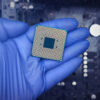At Technical Glass Products, we believe in delivering materials that meet—and exceed—the rigorous demands of today’s clean energy revolution. Fused quartz is one such material. With increasingly ambitious solar energy goals worldwide, it’s essential to select materials that offer both high performance and long-term reliability. Below, we explore why fused quartz is ideally suited for use across the solar value chain—from photovoltaic (PV) modules to concentrated solar power (CSP) systems—and how Technical Glass Products supports the industry with precision, high-quality fused quartz solutions.
1. Exceptional Optical Clarity & Transmission
One of the most critical requirements for solar components—especially for front covers of PV modules or for light-concentrating optics—is high light transmission with minimal absorption or scattering. Fused quartz exhibits outstanding clarity across the ultraviolet (UV) to infrared (IR) spectrum. It allows more of the solar spectrum to reach the active components, thereby maximizing energy capture. For modern solar installations where even marginal gains in transmission matter, fused quartz provides a superior performance edge.
2. Superior Thermal Stability
Solar equipment often operates under harsh conditions—intense sunlight, extreme heat at optical surfaces, rapid temperature cycling between day and night, and sometimes even partial shading that creates localized thermal spikes. Fused quartz has an extremely low coefficient of thermal expansion, enabling it to handle thermal shock far better than many glasses. It stays dimensionally stable and resists cracking or crazing under large and rapid temperature changes. In CSP systems in particular—where temperatures may approach or exceed 700 °C—fused quartz remains functional where many standard glasses would fail.
3. Resistance to Solar Material Degradation
Exposure to UV light, atmospheric moisture, pollutants, hail, or particulate abrasion can degrade many materials used in outdoor solar applications. Fused quartz resists UV-induced solarization (i.e., discoloration over time from UV exposure), is chemically inert to most environmental agents, and is highly resistant to devitrification. The result: lower maintenance, longer lifetimes, and reduced risk of performance loss due to clouding or material aging.
4. Excellent Mechanical Strength & Durability
In addition to its thermal qualities, fused quartz is mechanically robust. It has high hardness and wear resistance and is able to sustain the mechanical stresses that come from mounting, handling, cleaning, and occasional debris impact. For solar panels exposed at altitude or in dusty settings, or for mirrors in CSP systems that must reflect or redirect light, durability is essential. Fused quartz gives you peace of mind that the optical and structural components will retain performance over time.
5. Compatibility with High-Precision Manufacturing
Many modern solar systems require optical elements—lenses, prisms, waveguides, or concentrators—that must be fabricated with tight tolerances. Fused quartz is well-suited to precision shaping, polishing, and coating. It can be fabricated into thin sheets, complex optical surfaces, or flat plates with precise optical flatness and surface finish. That allows manufacturers to optimize light capture, minimize losses, and integrate modern coatings (anti-reflection, self-cleaning) without compromising substrate quality.
6. Long-Term Cost Efficiency
While fused quartz can be more costly upfront than many standard silica glasses, the lifecycle advantages often outweigh initial costs:
- Reduced failure rates under harsh thermal cycles.
- Longer service life without UV-induced damage or optical degradation.
- Lower maintenance and replacement costs over decades of operation.
These factors translate into lower levelized cost of energy (LCOE) for solar projects, better output stability, and higher return on investment.
7. Technical Glass Products’ Commitment to Quality & Support
At Technical Glass Products, we pair the intrinsic benefits of fused quartz with world-class engineering and support. Our manufacturing processes ensure minimal internal defects, tight control of purity, excellent homogeneity, and precise optical surface quality. We work with solar developers, module manufacturers, and CSP plant designers to tailor fused quartz products to task—whether for high-transmission front sheets, optical concentrators, or protective elements.
We understand the unique stresses solar applications impose—thermal, mechanical, environmental—and ensure that our fused quartz meets or exceeds the required specifications for reliability and performance. In addition, we assist our customers in selecting coatings and finishes that enhance transmission, durability, or ease of cleaning, further maximizing lifetime performance.
Conclusion
Fused quartz stands out as a premium material choice for the modern solar industry. Its combination of optical clarity, thermal stability, durability, and long-term performance makes it well suited for the kinds of demanding applications the solar sector requires.
At Technical Glass Products, we are proud to deliver fused quartz components that enable clean energy technologies to perform at their highest potential. When solar projects demand excellence not just today but over decades of operation, fused quartz with TGP’s engineering and quality assurance is an investment in durability, efficiency, and long-term success.







